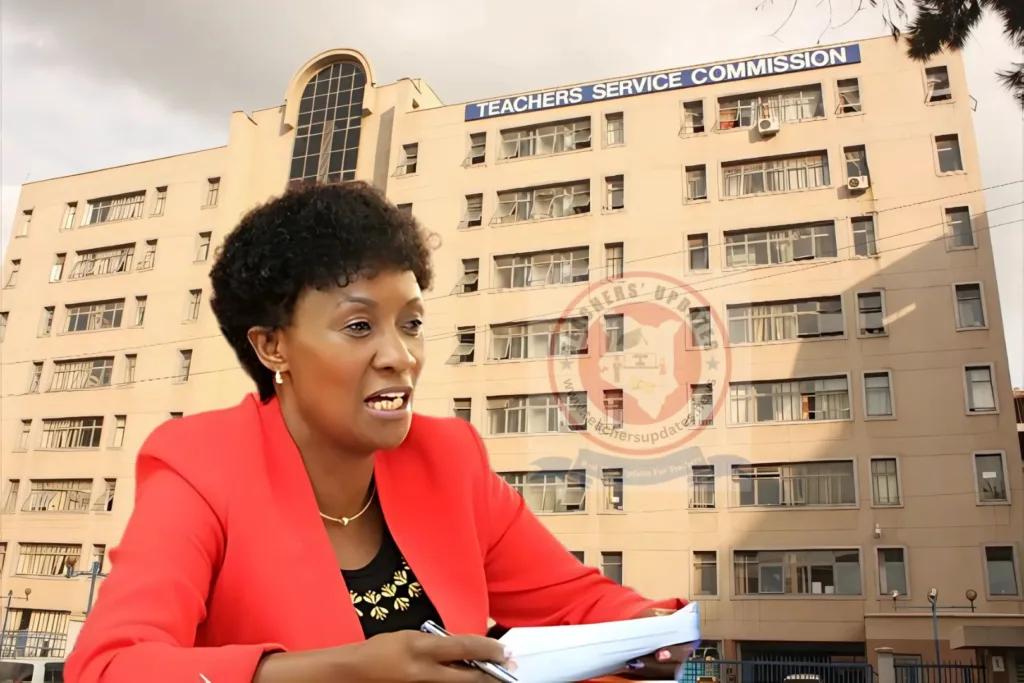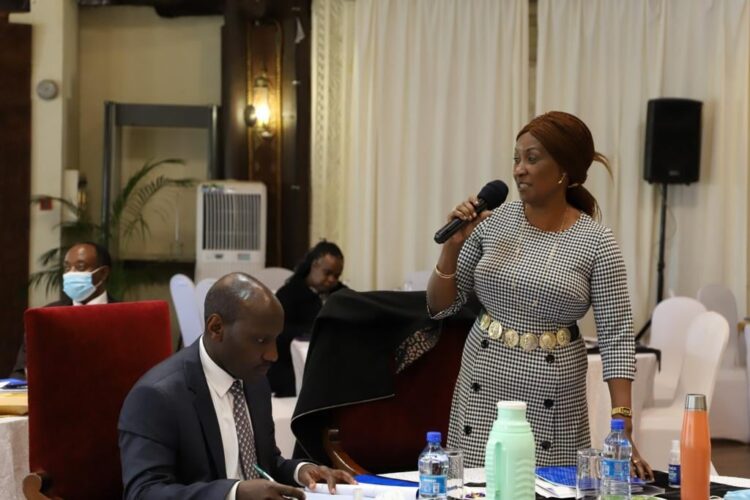TSC CEO Succession Race as Dr. Nancy Macharia’s Tenure Nears End.
The Teachers Service Commission (TSC) is set to initiate the recruitment of a new Commission Secretary and Chief Executive Officer (CEO) as the tenure of the current officeholder, Dr. Nancy Macharia, concludes in June this year. Under Section 16 (1) of the TSC Act 2012, the appointment of the next CEO will follow a competitive selection process, ensuring transparency and meritocracy.
While the Act does not specify the timeframe for advertising the position or the detailed steps for appointment, it mandates that by July 1, 2025, a substantive CEO must be in place. From that date onward, Dr. Macharia will no longer be authorized to conduct any business on behalf of TSC due to the expiration of her term.
To prevent a leadership vacuum, the Commission, consisting of eight Commissioners and Chairperson Dr. Jamleck Muturi John, must expedite the recruitment process before June 30, 2025.
Assuming the process begins in April, it may take up to three months, involving advertisement, application review, shortlisting, interviews, and final selection. This timeline is crucial in ensuring the appointment of a qualified candidate without disrupting the Commission’s operations.
Legal experts indicate that Dr. Macharia is not required to take terminal leave before the conclusion of her term, as such decisions rest with the TSC Commissioners. However, it has been established that she will be on terminal leave from April, allowing Commissioners to identify a successor.
The vacancy is expected to attract interest from senior educationists, including school principals, Ministry of Education officials, and top officers from state agencies within the education sector. Reports suggest that the Commissioners may favor an internal candidate over an external appointment, given the institution’s operational complexity.
Additionally, given TSC’s influence as the largest employer in East Africa, the selection process may draw attention from political figures. There are indications that President William Ruto could propose a candidate from the Public Service Commission’s (PSC) shortlist for Permanent Secretary positions, as the TSC CEO role aligns with that level of authority. Historically, the President’s recommendation carries significant weight in such appointments.
Qualifications and Appointment Terms
The TSC Act 2012 outlines specific criteria for appointing the Commission Secretary/CEO. The candidate must be a Kenyan citizen with a degree in education from a recognized university, possess at least ten years of experience in education, administration, public administration, human resource, or financial management, and meet the integrity standards outlined in Chapter Six of the Constitution.
The appointed CEO will serve a five-year term, renewable once. Under Section 17 of the Act, removal from office can only occur on grounds of incompetence, misconduct, constitutional violations, or inability to perform duties due to physical or mental incapacity. Before removal, the individual is entitled to a fair hearing and the opportunity to present a defense.
The TSC CEO functions as the head of the secretariat, accounting officer, and custodian of Commission records. Other responsibilities include implementing Commission decisions, assigning duties, supervising staff, and facilitating the execution of TSC’s mandate. These duties require strategic leadership and administrative competence.
Dr. Macharia’s Legacy: A Decade of Leadership
Dr. Macharia’s departure signals the end of a significant era in teacher management, sparking mixed reactions among education stakeholders. Some commend her for spearheading teacher employment initiatives, executing two Collective Bargaining Agreements (CBAs), and advancing digital transformation. Others criticize certain policies introduced under her leadership, citing limited inclusivity and consultation.
During her tenure, over 100,000 teachers were recruited, and substantial education sector reforms were implemented. She was also the first woman to serve as TSC CEO, maintaining strict operational control and ensuring policy adherence. While praised for efficiency, her leadership style was perceived by some as rigid.
Appointed in 2015 after Gabriel Lengoiboni’s retirement, she secured a second term in 2020. Her career spans over three decades, beginning as an assistant teacher and rising through the ranks to Deputy Principal at Kianderi Girls’ Secondary School in Murang’a County.
She holds a Doctorate in Education, a Master’s in Education Policy and Management from Bristol University (UK), and a Bachelor’s degree in Education from Kenyatta University. Recognized for her contributions, she received the Order of the Grand Warrior (OGW) award in 2014 from former President Uhuru Kenyatta.
Union Relations and Policy Controversies
Throughout her tenure, Dr. Macharia had a complex relationship with teacher unions. Initially, conflicts with the Kenya National Union of Teachers (KNUT) were frequent, especially regarding CBAs and career progression policies. Disagreements with former KNUT Secretary-General Wilson Sossion led to prolonged disputes, affecting union operations.
However, relations improved in later years under the leadership of Collins Oyuu, facilitating dialogue on salary adjustments and teacher promotions. Oyuu acknowledges her efforts, particularly in implementing the 2017-2021 CBA, decentralizing teacher management services, and increasing teacher employment. Nonetheless, he highlights promotion challenges and unpopular policies, such as teacher delocalization, which unions strongly opposed until its abolition.
Technology and Structural Reforms
Dr. Macharia played a crucial role in digitizing TSC operations, revolutionizing payroll processing, teacher transfers, and leave applications. Previously, teachers received payslips through Head of Institutions (HOI), sometimes leading to breaches of confidentiality. With digitization, teachers can now access their payslips securely and independently.

Moffats Okisai, KUPPET Busia Executive Secretary, lauded this transformation, emphasizing that digitization has streamlined services and facilitated better record management.
Challenges and Policy Backlash
Despite notable achievements, her leadership faced criticism over controversial policies. The teacher delocalization policy, which mandated transfers beyond home counties, was widely opposed for disrupting family life. Following persistent union resistance, the policy was abolished in July 2021.
Career Progression Guidelines (CPG) for promotions also generated discontent, with concerns over prolonged stagnation in job groups. Stakeholders urged a review to create a more equitable advancement structure. The mandatory Teacher Professional Development (TPD) program requiring continuous training further fueled debates.
Security concerns also arose regarding teacher deployments in volatile regions, particularly North Eastern Kenya. Calls for the transfer of non-local teachers to safer areas were inadequately addressed, resulting in legal battles and heightened tensions.
Future Expectations for the Next CEO
As the search for Dr. Macharia’s successor begins, education stakeholders anticipate reforms to address ongoing challenges. Priorities include reviewing Career Progression Guidelines, restoring trust in TSC, and ensuring merit-based promotions.
Union leaders stress the need for a more consultative leadership approach. KUPPET Narok Executive Secretary Charles Ng’eno calls for depoliticizing TSC operations, citing instances of political interference in teacher appointments. He asserts that the next CEO must exercise authority in staffing decisions and resist external influences.
Sub-county directors within TSC also seek improvements in working conditions, including timely facilitation fees for teacher recruitment, better allowances, and structured career progression. Addressing these concerns will be essential for maintaining morale and operational efficiency.
Conclusion
Dr. Macharia’s decade-long tenure has significantly shaped Kenya’s education sector. While her leadership saw remarkable achievements, it was also marked by policy debates and union disputes.
As TSC embarks on selecting a new CEO, the focus remains on ensuring a seamless transition while building on past successes. The education fraternity eagerly awaits a leader who will champion inclusivity, transparency, and progressive teacher management reforms.
TSC CEO Succession Race as Dr. Nancy Macharia’s Tenure Nears End.
Follow Teachers Updates on Facebook, LinkedIn, X (Twitter), WhatsApp, Telegram, and Instagram. Get in touch with our editors at [email protected].



Discussion about this post